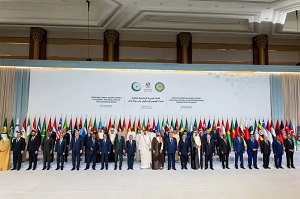Social development minister highlights Key women’s empowerment initiatives for EMV second executive programme
The Jordan Times
AMMAN — Minister of Social Development and Chair of the Inter-Ministerial Committee for Women’s Empowerment, Wafa Bani Mustafa, on Saturday outlined the priorities and initiatives set for the women’s empowerment sector in the next Executive Programme (2026–2029) of the Economic Modernisation Vision (EMV).
During a specialised working session at the Prime Ministry, Bani Mustafa presented the sector’s strategic objectives, centred on increasing women’s economic participation as a key driver of sustainable growth.
Special focus would be placed on young women, female university graduates, and enhancing the overall quality of life for women, families, and society, the minister said.
She also stressed the importance of improving Jordan’s standing in international gender indices and announced plans to develop a national index to monitor women’s economic engagement across targeted sectors, institutions, and enterprises.
Bani Mustafa also highlighted several achievements under the current phase of the EMV, including the launch of a dedicated women’s empowerment strategy and two studies assessing women’s status across 10 economic sectors and all governorates.
Notable advancements include the establishment of business incubators, training 2,881 women in economic skills, and transitioning 338 women from the informal to the formal labour market.
Early childhood care also saw progress, with the creation of 1,296 home-based nurseries serving over 51,000 children and generating 5,184 jobs for women. Support for digital entrepreneurship resulted in 100 online stores, 67 per cent of them led by women.
Discussions during the session also focused on creating an enabling environment for women in the workforce. "Key measures include adopting flexible work systems, forming a legal review team to examine labour, insurance, and corporate laws from a gender perspective, and updating the 2023 nursery system to support nurseries in remote areas, integrate children with disabilities, and streamline registration for home-based nurseries," the minister said.
Despite progress, challenges remain, including limited transportation access, persistent gender gaps in agriculture, the need for digital and AI training, and ongoing gender stereotypes in school curricula. Participants also called for legislative facilitation, broader access to e-commerce for micro-enterprises, incentives from economic aggregators, and increased legal awareness.
The session brought together public and private sector representatives and subject-matter experts to discuss proposals for the next EMV phase, including initiatives to close the gender wage gap, promote women’s financial inclusion, and develop tailored financing, training, and marketing programmes to boost women’s economic participation.
Latest News
-
 Arab-Islamic Summit issues final statement, condemns Israeli attack on Qatar, calls for accountability
Arab-Islamic Summit issues final statement, condemns Israeli attack on Qatar, calls for accountability
-
 King delivers Jordan's address at Emergency Arab-Islamic Summit in Doha
King delivers Jordan's address at Emergency Arab-Islamic Summit in Doha
-
 Leaders unite against ‘Israeli’ strike on Qatar at emergency Arab-Islamic Summit
Leaders unite against ‘Israeli’ strike on Qatar at emergency Arab-Islamic Summit
-
 Gaza’s death toll rises to 64,905: Health Ministry
Gaza’s death toll rises to 64,905: Health Ministry
-
 Rubio promises Netanyahu “unwavering support” to ‘Israel’ in Gaza goals
Rubio promises Netanyahu “unwavering support” to ‘Israel’ in Gaza goals